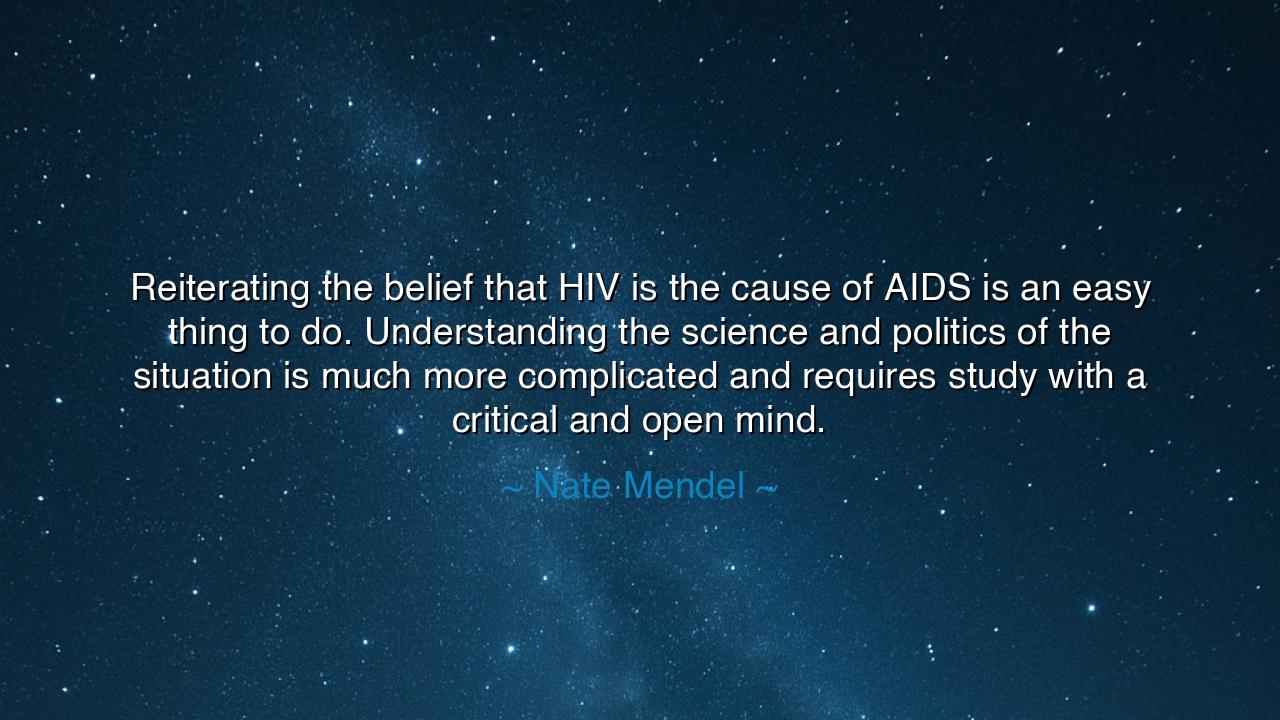
Reiterating the belief that HIV is the cause of AIDS is an easy
Reiterating the belief that HIV is the cause of AIDS is an easy thing to do. Understanding the science and politics of the situation is much more complicated and requires study with a critical and open mind.






“Reiterating the belief that HIV is the cause of AIDS is an easy thing to do. Understanding the science and politics of the situation is much more complicated and requires study with a critical and open mind.” So spoke Nate Mendel, not as a physician but as a seeker of truth, reminding us that the path of wisdom is never paved with mere repetition. To echo what is commonly said is effortless; to truly understand—to pierce the veil of appearances, to wrestle with the intertwined roots of science and politics—this is the labor of the thoughtful soul. His words remind us that the greatest challenges are not in chanting what the multitude already believes, but in questioning, examining, and discerning with courage and humility.
The quote emerges from the long and painful shadow of the AIDS crisis, a plague that swept through communities in the 1980s and 1990s. In those years, fear and confusion reigned. Misinformation spread faster than the disease itself, and the politics of stigma silenced the cries of the suffering. It was not enough merely to declare, “HIV causes AIDS.” The truth demanded more than repetition: it required unflinching study, the patient unraveling of complex evidence, and the willingness to face the uncomfortable truth that social and political forces shaped the tragedy as much as biology did. Mendel’s words call us to this deeper vigilance, to never be content with surface understanding when lives hang in the balance.
History gives us a mirror in the story of Ignaz Semmelweis, the Hungarian physician of the nineteenth century. He observed that physicians who washed their hands drastically reduced the deaths of women in childbirth. His discovery was grounded in science, yet because it challenged the medical authorities of his time, it was dismissed and ridiculed. Semmelweis’s truth was simple, but the politics of pride clouded the judgment of his peers. Only decades later, when Pasteur confirmed the germ theory, did the world recognize what had been before them all along. Mendel’s warning rings here: the quest for truth is never merely scientific, nor merely political, but a struggle against the entanglement of both.
Thus the heart of his teaching is this: do not confuse agreement with understanding. To repeat what others say is like building a house on sand—it may stand for a moment, but it collapses under the storm of inquiry. To understand requires the building of stone: critical thought, open mind, and rigorous study. Just as a healer listens not only to the words of the patient but to the whispers of the body itself, so too must we listen beyond the slogans and examine the foundations beneath them.
Mendel’s words are not a call to deny truth, but to strengthen it. He does not urge doubt for doubt’s sake, but rather a disciplined questioning, a humility that acknowledges the vastness of what we do not yet know. For every great truth has been born through trial, resistance, and the courage of those who looked deeper when others settled for the easy refrain. The blending of science with politics is not to be feared, but to be understood, so that power does not corrupt knowledge, and knowledge does not blind itself to the realities of power.
Therefore, O listener, let this lesson enter your heart: when you hear the chorus of certainty, do not be content to echo it. Seek the roots. Ask: what lies beneath this claim? Who speaks it, and why? What evidence is offered, and what evidence is ignored? Cultivate an open mind, not one that believes everything, but one that weighs, tests, and discerns. For only such a mind is truly free, and only such a heart can walk in wisdom.
Practical is the path before you: read beyond the headlines, learn the history behind the science, and question with humility, not with arrogance. Train your mind as a craftsman trains his hands—through patience, repetition, and care. Do not despise complexity, for it is the soil in which truth often hides. And when you find yourself in the midst of debate, remember: repeating what others say may win you applause, but understanding will give you strength. Let this strength be your guide, so that in all matters of life, you walk not as an echo, but as a seeker of truth.






AAdministratorAdministrator
Welcome, honored guests. Please leave a comment, we will respond soon